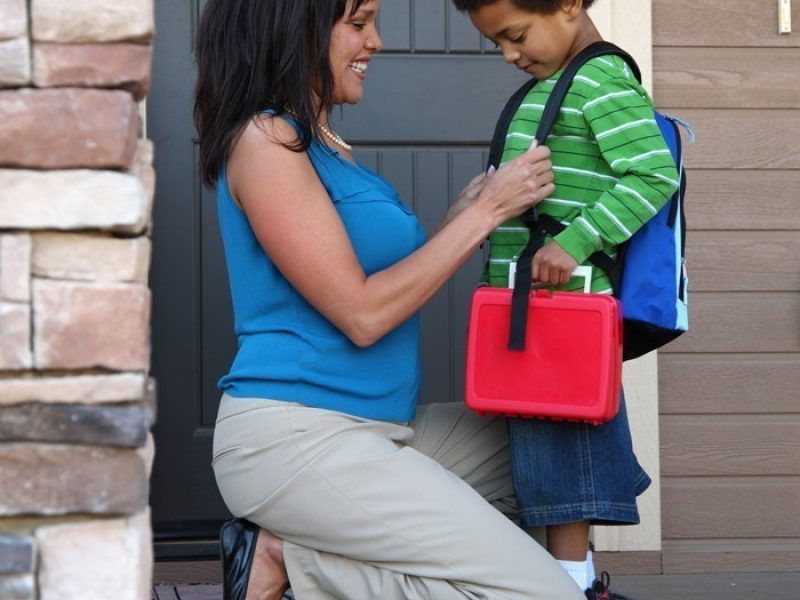Focus on the fun
Most children like school. But when it comes to starting primary school they may have mixed feelings, including feelings of uncertainty, fear and excitement all at the same time. Even though this is the case, be reassured that once they start most children usually enjoy it. But before they start they might feel a little uncertain. Focusing on the fun element will help get them excited about starting primary school.
Let them know that they’ll get to meet new friends, they’ll have time to play with other children, and they’ll learn new and exciting bits of information. They’ll have new pencils and pads to draw on. They’ll get to learn new games and new songs to sing.
It might be that they are going to start their new school with children they already know and like. If this is the case, emphasize that they’ll already know some of the children there. This will help them feel a little more confident about starting.
Take a trip to the school before they start
Going to a new environment can evoke feelings of uncertainty and anxiety in some children. To help minimize these feelings and enhance feelings of security and confidence, take them for a trip to their new school before they start.
Many schools offer open days for new students. Attending these open days can help familiarize your child with their new school environment. It might also help you get to know your way around.
Find out where their classroom is and take them up to the room if you can. Rehearse with them what might happen on their first day. Sit down with them behind the desk. Doing all of this will help them get used to what it feels like to be in the classroom.
If there are other children in the classroom, introduce yourself and your child to them and to their family. Doing this will help you create a friendship circle for your child. It may help identify allies for your child. Find the toilets and show them what they look like. Take them to the playground and have a go on the swings.
Find out who their teacher is (and any volunteers in their class). Introduce yourself and your child to these people.
Let the teacher and volunteers know that you’re both excited about starting primary school and you are looking forward to working with them in the year ahead. Remember, first impressions count so make sure you use this time well to create a good impression of you and your family.
If you can’t take a trip to the school before they start, perhaps you live out of state, then have a look on the school’s website (if they have one) and show your child pictures of their new school. You might be able to ask the teacher or school administrator to send you pictures of their new teacher and classroom. Doing this will help your child to become familiar with their new environment.
But if you are in the area, it wouldn’t hurt to drive or walk by the school during lunch times so they can see other children playing. Going by at the end of the school day when all of the children are being picked up to go home will also help them understand what to expect.
Get into the school routine
Unless you have other children already, your child may be unfamiliar with what their new routine will be. It’s helpful to let them know what to expect. Help them understand that they will be getting up early, putting on their school clothes and spending the whole day with other children and their teacher.
Reassure them that you or someone else will be there to meet with them each day at the end of their school day. Also, practice the school run. Show them how they will get to school. This may help them feel a little more comfortable about starting primary school.
Rehearsing the school run will help you familiarize yourself with the journey and how long it takes. Plus, your child will also become familiar with how long it takes to get to their new school and what it will feel like for them along the way.
Get them into the pattern to help them be mentally alert
Starting at school can be tiring for children. It requires a lot of thinking and stamina to begin with. It takes some children a little while to get into the pattern of the school routine. It will help your child if you can start to get them into a type of routine that fits with what they will need to do once they start school.
In the months leading up to starting school, give them little reminders about what they might be doing when they are at school at certain times throughout the day. Help them start to get into a good routine of going to bed early and waking up early. This will help them to be mentally alert from their very first day at school.
Involve them in getting ready
Starting school usually means a new school bag, pencils and pens, rulers, erasers and clothes. Draw up a list with your child and go together and choose what they need. Many schools will have a list of everything that your child will need. Make sure you get this list.
Starting school can be expensive for some families. If you need to, go through the list and work out what is essential and what you can buy later. This will help manage your budget when it comes to buying all of the new equipment and clothes. Pacing out the purchase of new items will mean that your child will have something to look forward to receiving later in the year.
Mention some of the school rules
Let your child know that there will be school rules. Just like you have rules in your own home there are rules for when they go to school. Don’t overemphasize the punishment aspect though. It’s likely that new students will be supported in learning the new rules when they first start. So you may not need to worry about that, at least for a little while. Plus, it’s important not to scare your child with warning them about getting things wrong before they even start.
But do help them understand that there are certain expectations and consequences when at school. For example, let them know that when the bell goes at the end of playtime they may need to go back up to their classroom. Let them know that when the teacher comes into the room at the beginning of the day all of the students may be expected to greet them. Let them know that they may need to put up their hand to ask a question. They may need to raise their hand to ask to go the toilet, for example, or to share what they think with others in the class.
Reassure them that the rules are there to help everyone get along and do well. Reassure them that most children find it fairly easy to not break the rules.
Remind them that they are special
Starting school will also mean that your child will have new opportunities to share information about themselves and their family. Preparing them for these questions and some of the potential responses that they may receive will help them cope with any negative or surprising reactions.
For example, let them know that most children at their new school may have a mum and a dad. But at the same time many children will have one mum, two mums, one dad or two dads. Some might have a dad and a pop. Some might have a grandma and granddad. Everyone is different and this difference is, in part, what makes everyone special.
Reassure them that all families are different and special, and their family is just as special and wonderful as any of the other families they will learn about. Let them know that some children may take a little time to understand how their family works.
If they have had good experiences from their preschool then draw upon these experiences to reassure them that it will all be alright. Also, let them know that if they have any problems or if anything happens that makes them feel upset or uncomfortable then they should talk to you about what happened. Then, together you both can work out what to do.
Support their emotions
Despite all that you do it is natural to expect that your child will still feel uncertain and unsure about starting school. It’s important to ask them how they are feeling and to respond to their feelings in a supportive way.
Reassuring them and going through these tips may help lessen some of their feelings of uncertainty and it will help you understand how they are feeling about starting at their new school. It will also help you prepare your family for this important and very exciting milestone.


